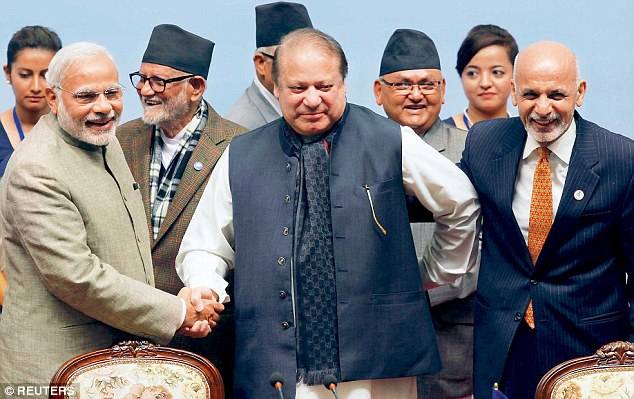In two separate statements yesterday, officials from Pakistan’s neighbouring states respectively called out Islamabad’s ‘lies’ over cross-border death toll, and threatened to strike inside the territory to take out jihadists’ safe havens. Neither of these statements came from India.
That Islamabad is currently engaged in a dispute over the number of Afghan soldiers killed by the Army, and that the Iranian Army chief is accusing Pakistan of shielding ‘Sunni militants’ and threatening action, is but a corollary of Islamabad’s diplomatic masochism – an anthology of abysmal failures that is fast approaching its golden jubilee.
This consistent diplomatic malfunction isn’t a multi-variable policymaking calculus that needs layered deconstruction. The self-mutilating equation is perfectly unraveled on the supremacism-bigotry axis, by the ensuing graph’s glaringly positive correlation. The calculation can be alphabetised into the three magic words: Sunni Muslim supremacy.
This sense of supremacy has damaged Pakistan’s ties with India, Afghanistan and Iran after being formally conceived by Zulfikar Ali Bhutto in Lahore, during the second summit of the Organisation of Islamic Cooperation in 1974. That’s when the newly oil-rich Arab states and newly amputated – but nuclear ambitious – Pakistan found one another to be a match made in jannah.
What started off as Muslim supremacism –academically known as Pan-Islamism – eventually added Sunnism to itself under Zia-ul-Haq. For, all supremacist movements are inherently self-aggrandising.
The latest tide of the Pan-Islamist juggernaut has had pit-stops at Deobandi and Wahabbi Islam, alienating Shia Iran through – among other numerous proxy ventures – Pakistan’s participation in the recent Saudi-led ‘Islamic military coalition’.
This ideological diplomacy in 70s and 80s was primarily fabricated keeping ‘Hindu’ India in mind, with the pre-Partition Two-Nation Theory providing invaluable fodder to paint the archenemy in accordance with the religion of the majority of its inhabitants. Bigoted curricula were, in turn, churned out for generations to consume in madrassas and private schools alike.
The propagation of a ‘Muslim Pakistan’ and ‘Hindu India’ not only created a perpetual nemesis in the east, it also transformed the indigenous nationalist movement for self-recognition in Kashmir to Islamist separatism. While this naturally helped breed eastbound jihadists, it also paved the way – or so Islamabad ensured – for mujahideen to be pumped towards the west to provide strategic depth to the military in Kabul.
These mujahideen were to be strategic assets, helping Pakistan avoid being flanked by India from both sides, at least a decade before their production was upped following American demands to curtail the then Soviet Union’s southward expansion. It was the Benazir Bhutto government in the 90s, spearheaded by the 'architect' Naseerullah Babar, that facilitated Taliban government in Afghanistan to finally formalise Pakistan's ambitions in the western neighbourhood.
Blinded by mistaking pan-Islamism as a ‘natural order’ between Muslim states, Pakistan failed to even remotely consider the possibility that the neighbouring sovereign state mightn’t formulate its relations with regional states based on religious affinity.
This laid the foundation of Pakistan’s racist foreign policy vis-à-vis Afghanistan wherein the Pashtun stereotype of an Islam-obsessed war junkie was disseminated.
The stereotype, which continues to flourish to this day, asserts in no uncertain terms that the Pashtuns intrinsically uphold militant Islamist tendencies, and hence not only are they ready-to-use diplomatic pawns against ‘Hindu India’, they’re also ‘racially suited’ to uphold armed jihad wherever Islamabad might deem best.
This blend of racism and Pan-Islamist supremacism was palpable in Frontier Corps Inspector General Nadeem Ahmad’s claims of killing ‘50 Afghan soldiers’ on Sunday. He claimed that ‘Pakistan military will reply more sternly next time’ even though ‘we are not happy to kill our Muslim brothers’ following the cross-firing that was a ‘result of Delhi-Kabul nexus’ – the condescension here his own.
There are few diplomatic exclamations more racist than the frequent utterance of a New Delhi-Kabul nexus – a decades-old self-fulfilling prophesy – echoed by Islamabad after every unpleasant confrontation with Afghanistan. Because of course the Afghans can’t think for themselves, can they?
This is not at all to deny the reality of the India-Afghanistan bond, which continues to strengthen on multiple fronts. But to reduce that alliance to a hypnotic act on the part of New Delhi, and not Kabul’s independently thought out policy, perfectly epitomises Islamabad’s depiction of the Afghans as intellectually inferior, or worse as Pakistan’s geopolitical stepney.
If this religio-racial supremacism were an actual ideology, Pakistan would have long pulled the plug on its ties with China – incidentally the only bordering neighbour that it gets along with – considering the anti-Muslim bigotry perpetuated by Beijing in its Muslim majority Xinjiang. In fact the very raison d’etre for Beijing’s record overseas investment in the China Pakistan Economic Corridor (CPEC) is to further its neoliberal stranglehold over its largest province where a separatist Uighur Muslim movement has been brewing for decades.
And so while Afghan and Kashmiris are Muslims first before their ethnic identities, the Turkic struggling for an independent East Turkestan do not fall into Islamabad’s Pan-Islamic lens.
With the Pan-Islamist diplomacy clearly a façade to control sovereign states and regions, it shouldn’t come as a surprise that both Afghanistan and Iran are gravitating towards India, despite the Hindutva surge.
If Pakistan’s vociferous rallying cries of ‘Muslim brotherhood’ have continuously failed to woo the Muslim neighbours, and an anti-Muslim Hindutva regime hasn’t managed to ward them away from India, it shows that Islamabad’s diplomatic pagans remain the only ancient species to believe in religion as a factor in foreign policy.
Islamabad should absolutely take up all its claims against Kabul, including the cross-border firing incident in Chaman and the assertion that the Pakistani Taliban have found hideouts in Afghanistan. But as long as these claims are insultingly attributed to an imaginary Indian voodoo and painted as ‘backstabbing of a Muslim brother’, this racist and supremacist foreign policy would ensure that Islamabad remains a part of the problem in Kabul and Srinagar – not the solution.






